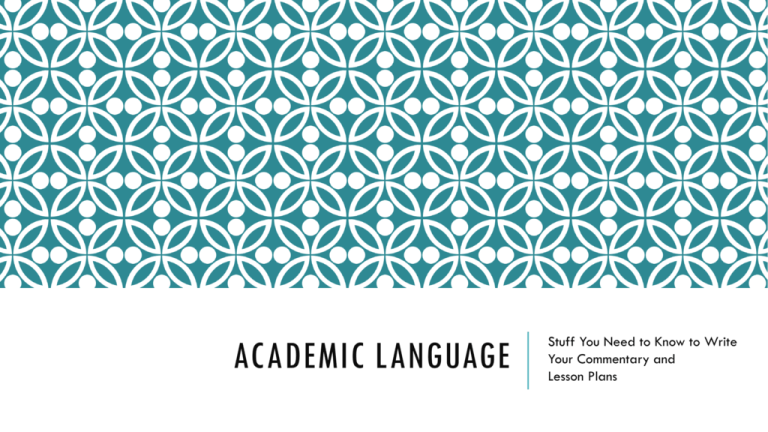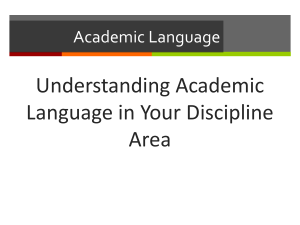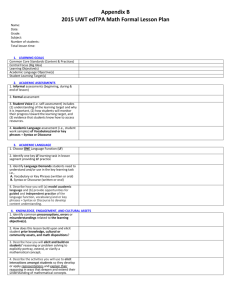Academic Language SP 2015 - EarlyChildhoodFieldExperience
advertisement

ACADEMIC LANGUAGE Stuff You Need to Know to Write Your Commentary and Lesson Plans THE ACADEMIC LANGUAGE CONNECTION "If we think about academic language as the oral and written language that students need in order to understand (read, listen, think), communicate (listen, speak, write, connect), and perform (think, read, write, listen, speak, create) in the specific subject areas taught in schools, we realize that it is complex and complicated. We are teaching our students ways of participating in the content—how to think about it, how to question or talk about it, how to learn it." Melanie Hundley, 2012 https://www.brockport.edu/oat/ docs/ALanguage_Cimbricz%20FI NAL1.pdf LANGUAGE FUNCTION LANGUAGE FUNCTION oThe way students should think as a result of the lesson. oWhat students DO. Strategy they use. oRepresented by the action verb within the learning outcome (identify, list, explain, compare and contrast etc.) oBloom’s Taxonomy LANGUAGE FUNCTION Found in Central Focus in Commentary The central focus of this lesson is for students to analyze character traits of main characters by comparing and contrasting their traits. Central Focus Main concept/idea Learning segment (several lessons connected) Broad Found in Lesson Plan The student will be able to compare and contrast three similarities and differences of two main characters. Lesson Outcomes/Target/Objectives Target one/more aspects of the central focus Specific Detailed LANGUAGE FUNCTION Central Focus: Students justify the branches of government Learning Outcome for Lesson 2: The student will be able to (TSWBAT) identify two responsibilities for each component of the executive branch. LANGUAGE DEMAND LANGUAGE DEMAND oMethod students use to express their understanding of the subject matter. oMethods fall into three categories: Vocabulary, Syntax or Discourse oFound in the Lesson Plan and Commentary oRepresented in the products, assignments, and practice activities in which students participate. oCan involve writing, speaking, listening, reading, or drawing. LANGUAGE DEMAND Central focus of this lesson is for students to analyze character traits of main characters by comparing and contrasting their traits. Syntax – completing venn diagram or T chart Discourse – writing sentences to describe character Vocabulary – use 3 synonyms to describe character or 3 adjectives to describe character LANGUAGE DEMAND Central Focus: Interpret unfamiliar words as they are used in informational text. Language demands: List words by writing on paper (syntax) Define words by using a dictionary (syntax) Recite definitions to a partner (discourse) Write personal interpretation of words in relation to text (discourse) SYNTAX SYNTAX System or tool used to organize writing or speech Set of conventions for organizing symbols, words and phrases together into structures (e.g., sentences, graphs, tables) How students organize the information Compare & Contrast – Venn Diagram DISCOURSE DISCOURSE oWritten or spoken product used to convey information oWriting or speaking to convey information. oEssays, debates, multimedia presentations, reports, discussions etc. DISCOURSE What should be included? Who, what, when, where, why? How are the pieces of information organized? What comes first etc.? Common Core Text Types for omposition Argument; Gather information and establish a position on the topic Expository; Provides evidence, characteristics are; first, next, finally etc. Informational; Analyzing and synthesizing informational; never personal opinions Narrative; Tells a story, to entertain Writing requires something to say, the words to say it, and the structure with which to write it (McCracken & McCracken, 1986). LANGUAGE SUPPORT LANGUAGE SUPPORT oInstructional strategies and supports used by the teacher to help the student meet the objectives of the lesson. oIncludes teaching vocabulary (subject specific or general), teaching the organization method (syntax) or use of words (discourse) necessary to accomplish the learning function. LANGUAGE SUPPORT Central Focus –students to analyze character traits of main characters by comparing and contrasting their traits. List adjectives about character (syntax) – show example on anchor chart Complete Sentence stems (syntax) - demonstrate and create list Describe character to nearby partner (discourse) – circulate, listen and model Write a paragraph on character traits (discourse) – collect and provide feedback LANGUAGE SUPPORT Central Focus – Interpret unfamiliar words as they are used in informational text. List words on paper (syntax) – show example on anchor chart Define using dictionary (syntax) - demonstrate how to look up words & practice Speak definition to nearby partner (discourse) – circulate, listen and model Write interpretation (discourse) – collect and provide feedback YOUR LESSON PLAN Central Focus Learning Outcome - Comprehension (Text) or Composition (Tasks) Language Function Language Demand – Syntax (Organization) or Discourse (Words) Language Supports WRITING POINTERS DISCOURSE CONNECTIVES I SAW THE STUDENTS……..THE STUDENTS Avoid Using Personal Use Words Referring to Evidence I think From examining the findings, I feel In light of the evidence, I believe From previous research, I am convinced that Considering the results, I disliked According to the figures, I liked As shown in the diagram, I agree It is evident from the data, I disagree The literature suggest, I am sure that Given this information It is my belief that Some theorists argue,








